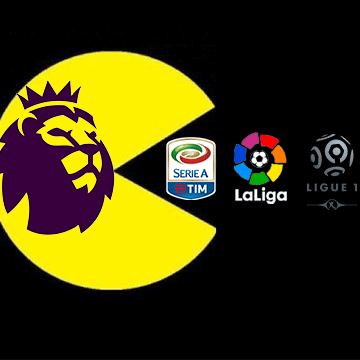Are Premier League Riches Destroying European Football?

Posted on 10th August 2016

On a hazy evening at Old Trafford in May 2003, Andriy Shevchenko took a deep breath. Facing Gianluigi Buffon, the Ukrainian icon was 12 yards away from securing AC Milan’s sixth European Cup, with the deciding penalty in a shootout against domestic rivals Juventus.
Sending Buffon the wrong way, he scored and sent the Rossoneri into raptures. It was the height of yet another powerful era on the red and black side of the San Siro, with Carlo Ancelotti, a key protagonist for both Arrigo Sacchi and Fabio Capello in the late 1980s and early 90s, in charge, leading the likes of Shevchenko, Clarence Seedorf, Paolo Maldini and, a year or two later, Ricardo Kaka, to numerous successes.
In the very same month, and about 180 miles to the south of Manchester, West Ham United were in crisis. Despite having one of the Premier League’s more talented squads, packed with the likes of Freddie Kanoute, Jermain Defoe and Joe Cole, the East London side were relegated under the stewardship of Trevor Brooking, the club legend who stepped in after boss Glenn Roeder suffered a brain tumour.
There could hardly have been a greater contrast between the two clubs at that time, but football never stays the same and nothing is ever permanent. The fluctuations of the game make it so brilliantly unpredictable.
In this case, financial changes have made a huge impact. Now 13 years on, West Ham are in the hunt to take Milan’s top striker, Carlos Bacca, to the Olympic Stadium as the star attraction as the dawn on a new era rises, with a very good chance of sealing a deal for the Colombian.
While Milan have regressed for a number of years, under the faltering ownership of Silvio Berlusconi, this is just one example of a wider phenomenon sweeping the English game this summer. Some of the biggest clubs in Europe are now struggling to match the clout most Premier League sides.
When Xherdan Shaqiri left Milan’s city rivals Inter for the one-time epitome of football’s dark arts Stoke City last summer, it became the move with arguably the most media attention of the window. Eyebrows were raised, but with the way transfers are going, it looks like becoming standard practice nowadays.
Arguments and debate could continue forever, but with the lack of defined criteria, it is hard to know which league is the best in the world. Perhaps in terms of quality, the Premier League lags behind La Liga and possibly the Bundesliga, but from a business and marketing side, there really isn’t any competition.
Because the biggest stars in the world play for Barcelona, Real Madrid and Bayern Munich, it once looked as though there would become a real gulf in the world of football. Impressive performances from the likes of Atletico Madrid and Leicester City show the impact of effort and teamwork, but more importantly, none of that trio top the list for financial income with sponsorships, meaning gaps are shrinking.
Manchester United, Chelsea, Manchester City, Arsenal and Liverpool will all earn more from shirt deals over the next few years, giving them an advantage even before the brand new television deal, which is also distorting the whole of football.
In 2015, French side St Etienne’s co-president Bernard Caizzo claimed that, unless UEFA acted, the Premier League would become the ‘NBA of football’; something La Liga chief Javier Tebas insisted must be avoided in the same year. Per Caizzo’s request, European football’s governing body are powerless to stop the Premier League’s growth, with the Financial Fair Play rules not being breached as clubs spend what they earn: The TV money, for the most part.
Throughout the league, teams are able to buy above their station quite easily and it wasn’t just Shaqiri last summer who surprised. Newcastle were able to persuade PSV Eindhoven’s Eredivisie winning captain Gini Wijnaldum to swap Champions League football for an ultimately unsuccessful relegation battle.
All the while, transfer fees continue to rise. Gone are the days of £20 million buying a world-class striker, or £10 million being enough for a potential future star.
Traditionally, Real Madrid are the world’s wealthiest buyers, breaking the world transfer record no fewer than five times in the 21st century. Even they were priced out of the race for Paul Pogba, who signed for Manchester United for a world-record £89 million deal.
Both on an off the pitch, the age of the underdog is rising. From Leicester’s title to Iceland and Wales’ impressive displays at Euro 2016, David is proving he can beat Goliath, but soon historically big clubs could be on the receiving end of rude awakenings from seemingly average sides on these shores.
Just thirteen years have past since Shevchenko’s penalty and West Ham’s demise, but now Milan look like losing their biggest asset to the Hammers. The most shocking thing of all is it is no longer a deal where the word ‘audacious’ is an applicable description.
About the author – Harry De Cosmo
Harry is a European football writer specialising in English, Spanish and Italian football. He has worked for a number of top publications including MARCA in English, uMAXit football, FourFourTwo, Squawka and The Press Association.
twitter – @harrydecosemo
